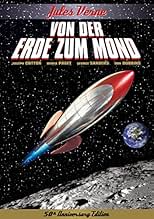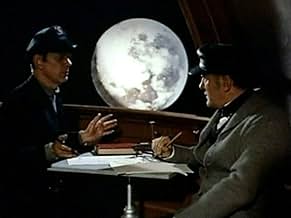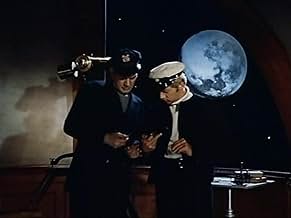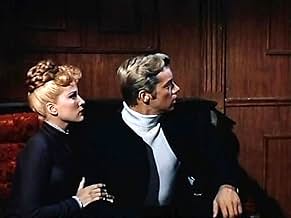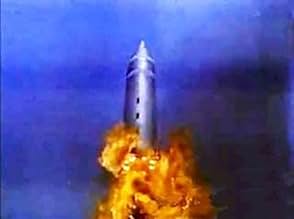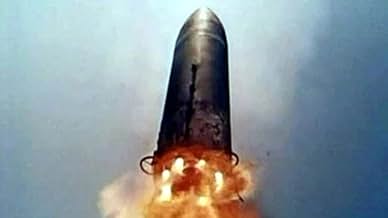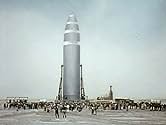CALIFICACIÓN DE IMDb
5.1/10
1.9 k
TU CALIFICACIÓN
Agrega una trama en tu idiomaIn 1868, American inventor Victor Barbicane develops a powerful military explosive that he also uses as fuel for a moon-bound rocket manned by himself and a motley crew.In 1868, American inventor Victor Barbicane develops a powerful military explosive that he also uses as fuel for a moon-bound rocket manned by himself and a motley crew.In 1868, American inventor Victor Barbicane develops a powerful military explosive that he also uses as fuel for a moon-bound rocket manned by himself and a motley crew.
- Dirección
- Guionistas
- Elenco
Ludwig Stössel
- Aldo Von Metz
- (as Ludwig Stossel)
Morris Ankrum
- US President
- (sin créditos)
Robert Clarke
- Narrator
- (voz)
- (sin créditos)
Les Tremayne
- Countdown Announcer
- (sin créditos)
Opiniones destacadas
To bad many of the comments here seem to be from jaded action film viewers. They can't seem to appreciate this films many merits including the fact it's a showcase for Cotton's and Sander's enormous talents. Talents to rarely used after their heydays in Hollywood. They both do a marvelous job here, especially Cotton. Yeah, compared to the action packed plot less junk we have today this may seem "slow" in comparison. But there is much more to this film then the gun fights, explosions, and "cool" space battles people seem to require these days. The colorful sets and the acting are a joy to see. And if you look just below the surface you'll find this a refreshing variation on the typical "horrors of atomic energy" films so popular in the 50s.
If you have an open mind and love sci-fi films that dare to be different for their time, you should enjoy this.
If you have an open mind and love sci-fi films that dare to be different for their time, you should enjoy this.
After the Civil War, arms inventor Victor Barbicane (Joseph Cotten) creates a super explosive he calls Power X. But he faces public opposition from steel manufacturer Stuyvesant Nicholl (George Sanders), a supporter of the Confederacy who has an irrational hatred of Barbicane. After being forbidden from using his formula by President Ulysses S. Grant, Barbicane turns to building a spaceship that will be shot to the moon by a cannon. And he needs his arch-rival Nicholl's help to do it.
I'm perplexed as to why this one is so hated on here. At first I thought maybe it was Mystery Science Theater 3000, which is often to blame when you see an older movie on IMDb with a lot of negative reviews and a lower than deserved score. But it doesn't appear this was featured on that show. Many of the reasons given in the reviews I've read here could fit a dozen other respected sci-fi films from the same era. Complaining that the movie has dated special effects? Really? The only reason I don't rate it higher myself is because it's basically 100 minutes of the rivalry and reluctant partnership between these two men with nothing much in the way of sci-fi spectacle that you expect from a movie based on a Jules Verne novel. But those men are Joseph Cotten and George Sanders, who both give charismatic performances. This wasn't challenging stuff for either actor, and both have certainly done better, but they do very well with what they're given here. Debra Paget (with dyed blonde hair) is largely wasted. Fantastic job by Morris Ankrum in his one scene as President Grant. There isn't much in the way of effects but the little bit there is has the kind of quaint charm to it that I enjoy about period sci-fi films. Like I said, I don't get the fervent hatred of this movie. It's not one of the great sci-fi films from the Golden Age, nor is it the best Verne adaptation brought to the screen, but it's not a terrible film. It's actually quite enjoyable and a good way to pass the time. Love that final corny scene. It's a good corny, in my opinion.
I'm perplexed as to why this one is so hated on here. At first I thought maybe it was Mystery Science Theater 3000, which is often to blame when you see an older movie on IMDb with a lot of negative reviews and a lower than deserved score. But it doesn't appear this was featured on that show. Many of the reasons given in the reviews I've read here could fit a dozen other respected sci-fi films from the same era. Complaining that the movie has dated special effects? Really? The only reason I don't rate it higher myself is because it's basically 100 minutes of the rivalry and reluctant partnership between these two men with nothing much in the way of sci-fi spectacle that you expect from a movie based on a Jules Verne novel. But those men are Joseph Cotten and George Sanders, who both give charismatic performances. This wasn't challenging stuff for either actor, and both have certainly done better, but they do very well with what they're given here. Debra Paget (with dyed blonde hair) is largely wasted. Fantastic job by Morris Ankrum in his one scene as President Grant. There isn't much in the way of effects but the little bit there is has the kind of quaint charm to it that I enjoy about period sci-fi films. Like I said, I don't get the fervent hatred of this movie. It's not one of the great sci-fi films from the Golden Age, nor is it the best Verne adaptation brought to the screen, but it's not a terrible film. It's actually quite enjoyable and a good way to pass the time. Love that final corny scene. It's a good corny, in my opinion.
A scientist (Joseph Cotton) and a millionaire arms dealer (George Sanders) team up on the construction of a rocket to blast themselves to the Moon. This movie was based on a Jules Verne classic -- but it completely lacks the charm and the quality of `Journey to the Center of the Earth' and `20,000 Leagues Under the Sea'.
Even though the cast includes Morris Ankrum (the Grand Old Man of vintage sci-fi) to provide dignity, and Debra Paget to provide scenery (watch `Princess of the Nile' and go quietly insane), it wasn't enough to save this numbingly slow and unappealing film.
Some of the special effects are astoundingly bad, considering the fair production standards. In the scenes of the blast-off, the supporting bar which holds up the rocket model is clearly visible! Fans of `Forbidden Planet' will notice the heavy use of the `electronic tonalities' borrowed from that classic. Directed by Byron Haskins, who did both `War of the Worlds' and `The Conquest of Space'.
Even though the cast includes Morris Ankrum (the Grand Old Man of vintage sci-fi) to provide dignity, and Debra Paget to provide scenery (watch `Princess of the Nile' and go quietly insane), it wasn't enough to save this numbingly slow and unappealing film.
Some of the special effects are astoundingly bad, considering the fair production standards. In the scenes of the blast-off, the supporting bar which holds up the rocket model is clearly visible! Fans of `Forbidden Planet' will notice the heavy use of the `electronic tonalities' borrowed from that classic. Directed by Byron Haskins, who did both `War of the Worlds' and `The Conquest of Space'.
A scientist (Joseph Cotton) and a millionaire arms dealer (George Sanders) team up on the construction of a rocket to blast themselves to the Moon. This movie was based on a Jules Verne classic -- but it completely lacks the charm and the quality of `Journey to the Center of the Earth' and `20,000 Leagues Under the Sea'.
Even though the cast includes Morris Ankrum (the Grand Old Man of vintage sci-fi) to provide dignity, and Debra Paget to provide scenery (watch `Princess of the Nile' and go quietly insane), it wasn't enough to save this numbingly slow and unappealing film.
Some of the special effects are astoundingly bad, considering the fair production standards. In the scenes of the blast-off, the supporting bar which holds up the rocket model is clearly visible! Fans of `Forbidden Planet' will notice the heavy use of the `electronic tonalities' borrowed from that classic. Directed by Byron Haskins, who did both `War of the Worlds' and `The Conquest of Space'.
Even though the cast includes Morris Ankrum (the Grand Old Man of vintage sci-fi) to provide dignity, and Debra Paget to provide scenery (watch `Princess of the Nile' and go quietly insane), it wasn't enough to save this numbingly slow and unappealing film.
Some of the special effects are astoundingly bad, considering the fair production standards. In the scenes of the blast-off, the supporting bar which holds up the rocket model is clearly visible! Fans of `Forbidden Planet' will notice the heavy use of the `electronic tonalities' borrowed from that classic. Directed by Byron Haskins, who did both `War of the Worlds' and `The Conquest of Space'.
Certainly the effects of this film are no where near what we are used to today, but the inventiveness to even attempt to portray Vernes' rich imagination are secondary to the effort to bring such imagination from the page to the visual arts. There are inventive approaches to pre-real space travel, and the scientific accuracy (or real lack thereof) are secondary to the underlying Drama and dilemma presented about technological advances and the impact they have by affecting Man's commission of War upon his fellow man. So when watching this movie enjoy the players and do not cast aside because of reality fallacies and liberties taken in order to bring a book to visual life.
¿Sabías que…?
- TriviaSome of the music is actually the "electronic tonalities" created by Louis Barron and Bebe Barron for El planeta desconocido (1956).
- ErroresDespite dire warnings of death should occupants of the projectile NOT be in the "acceleration tubes" upon launch, no explanation is offered as to why Virginia isn't turned to goo by stowing away in another room.
- Créditos curiososOpening credits are on the pages of a book, with the leads' photos included above the name.
- ConexionesReferenced in Trumbo (2007)
- Bandas sonorasElectronic Tonalities
(uncredited)
from El planeta desconocido (1956)
composed by Bebe Barron and Louis Barron
heard during the scenes on board the rocket
Selecciones populares
Inicia sesión para calificar y agrega a la lista de videos para obtener recomendaciones personalizadas
- How long is From the Earth to the Moon?Con tecnología de Alexa
Detalles
- Fecha de lanzamiento
- País de origen
- Idioma
- También se conoce como
- From the Earth to the Moon
- Locaciones de filmación
- Productoras
- Ver más créditos de la compañía en IMDbPro
- Tiempo de ejecución1 hora 41 minutos
- Relación de aspecto
- 1.85 : 1
Contribuir a esta página
Sugiere una edición o agrega el contenido que falta

Principales brechas de datos
By what name was Del centro de la Tierra a la Luna (1958) officially released in India in English?
Responda

